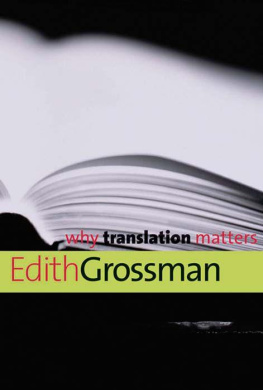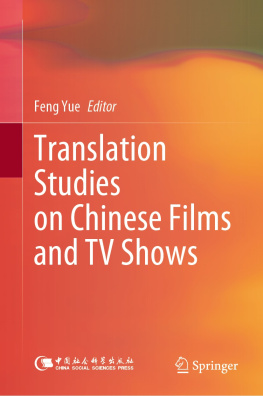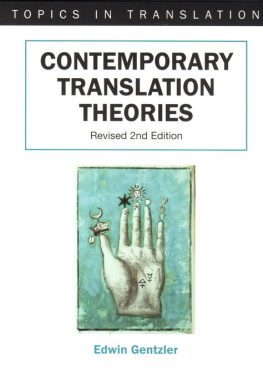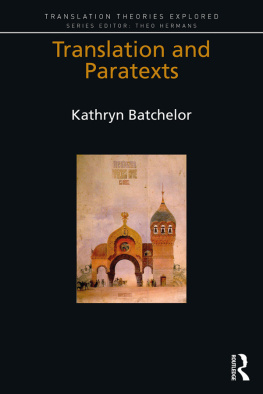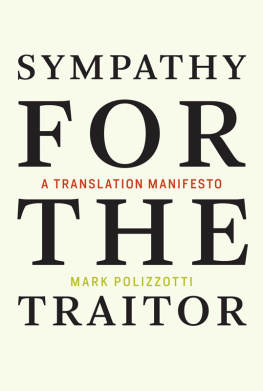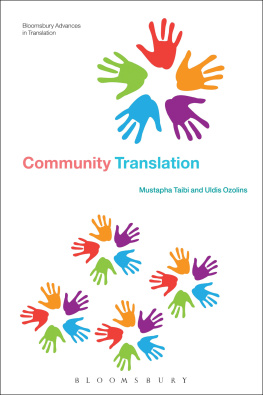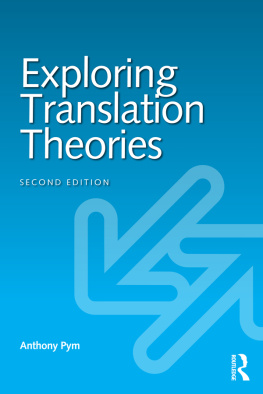why translation matters


Copyright 2010 by Edith Grossman.
All rights reserved.
This book may not be reproduced, in whole or in part, including illustrations, in any form (beyond that copying permitted by Sections 107 and 108 of the U.S. Copyright Law and except by reviewers for the public press), without written permission from the publishers.
Published with assistance from the Louis Stern Memorial Fund.
Why X Matters and the yX logo are trademarks of Yale University.
Set in Adobe Garamond type by Keystone Typesetting, Inc., Orwigsburg, Pennsylvania. Printed in the United States of America.
Library of Congress Cataloging-in-Publication Data
Grossman, Edith.
Why translation matters / Edith Grossman.
p. cm. (Why X matters)
Includes bibliographical references and index.
ISBN 978-0-300-12656-3 (cloth : alk. paper) 1. Literature
Translations. 2. Translating and interpreting. I. Title.
PN241.G75 2010
418.02-dc22 2009026510
A catalogue record for this book is available from the British Library.
This paper meets the requirements of ANSI/NISO Z39.48-1992 (Permanence of Paper).
10 9 8 7 6 5 4 3 2 1
selected translations by edith grossman
Miguel de Cervantes, Don Quixote
The Golden Age: Poems of the Spanish Renaissance
Gabriel Garca Mrquez, Memories of My Melancholy
Whores; Living to Tell the Tale; News of a Kidnapping;
Of Love and Other Demons; Strange Pilgrims; The
General in His Labyrinth; Love in the Time of Cholera Mario Vargas Llosa, The Bad Girl; The Feast of the Goat;
The Notebooks of Don Rigoberto; Death in the Andes Mayra Montero, Dancing to Almendra; Captain of the
Sleepers; Deep Purple; The Red of His Shadow; The Last
Night I Spent With You; The Messenger; In the Palm of
Darkness Julin Ros, Monstruary; Loves That Bind Carmen Laforet, Nada
Alvaro Mutis, The Adventures and Misadventures of
Maqroll Carlos Fuentes, Happy Families Antonio Muoz Molina, A Manuscript of Ashes Santiago Roncagliolo, Red April Eliseo Alberto, Caracol Beach Augusto Monterroso, Complete Works and Other Stories
contents
preface
In 2007 Professor Mara Rosa Menocal invited me to Yale University to initiate an annual lecture series under the auspices of the Whitney Center for the Humanities. The general title of the series was to be Why X Matters, the X depending on the field or area of specialization of the person delivering the lectures. In my case, naturally, that fearsome unknown quantity was translation.
I agreed immediately. I have always enjoyed my visits to Yale and the opportunity to talk to the intelligent, enthusiastic students and committed faculty I meet there. Then too, I invariably take great pleasure in speaking about translation, in all kinds of settings, formal and informal, casual and academic.
The introduction and first two chapters of the book are based on three talks I gave at the Whitney Center in the spring of 2008. The final chapter, Translating Poetry, was written especially for this volume. It was inspired by recent work I had either completed or was about to begin: the selection of Renaissance poems I had translated a few years earlier for Norton, which were published in 2006 in The Golden Age: Poems of the Spanish Renaissance , and, under the aegis of the Guggenheim Foundation, the major translating projectLuis de Gngora's Soledades that would occupy most of my time in 2009. I had frequently discussed the issues involved in the translation of fiction, but preparing this book seemed the perfect moment to begin to address the even more problematic question of how one transfers a poem from one language to another.
I hope the reading of these essays inspires other ways to think about and talk about translation. My intention is to stimulate a new consideration of an area of literature that is too often ignored, misunderstood, or misrepresented. As the world seems to grow smaller and more interdependent and interconnected while, at the same time, nations and peoples paradoxically become increasingly antagonistic to one another, translation has an important function to fulfill that I believe must be cherished and nurtured. Translation not only plays its important traditional role as the means that allows us access to literature originally written in one of the countless languages we cannot read, but it also represents a concrete literary presence with the crucial capacity to ease and make more meaningful our relationships to those with whom we may not have had a connection before. Translation always helps us to know, to see from a different angle, to attribute new value to what once may have been unfamiliar. As nations and as individuals, we have a critical need for that kind of understanding and insight. The alternative is unthinkable.
introduction: why translation matters
No problem is as consubstantial
with literature and its modest
mystery as the one posed by
translation.
JORGE LUIS BORGES ,
Las versiones homricas
T o introduce these essays, I thought it would be useful to pass along some incidental information about my background and the circumstances that led me, however indirectly, to a career in translation.
When I was younga high school studentit was not my intention to be a translator. I knew I wanted to learn languages and had a vague idea about being an interpreter. (I wasn't quite sure what the difference between the two professions was, but interpreting sounded more exciting; it suggested travel, exotic places, important events, world-shaking conferences at the United Nations.) As an undergraduate at the University of Pennsylvania, I changed direction and decided my ambition was to be a literary critic and scholar, even though, operating under the mistaken assumption that apparently simple poetry was simple to translate, I do recall submitting a few poems by Juan Ramn Jimnez and, if I remember correctly, Gustavo Adolfo Bcquer, to the campus literary magazine. I embarked on an academic career, served my time in several graduate schools, and moved from a focus on medieval and baroque peninsular verse, first the Galician-Portuguese love lyrics and then the sonnets of Francisco de Quevedo, to contemporary Latin American poetry, a change brought about by my first reading of works by Pablo Neruda, and soon after that Csar Vallejo. (I came on this stunning poetry fairly late in my student career: I have no memory of reading any Latin American literature written after the Mexican Revolution until I made the cross-country trek to Berkeley.) Neruda's Residencia en la tierra in particular was a revelation that altered radically the professional direction I followed and actually changed the tenor of my life. It elucidated for me, as if for the first time, the possibilities of poetry in a contemporary environment. Above all, it underscored the central position of Latin America in the literature of the world, its impact made possible and even more telling by means of translation.
I began teaching while I was a graduate student, and then continued giving classes full-time when I moved back east and enrolled in New York University. During most of this time I was thinking more about my dissertation than about translation. But one day Ronald Christ, a friend who edited the magazine Review , the publication of the organization once called the Center for Inter-American Relations and now known as the Americas Society, asked me to translate a story by the Argentine Macedonio Fernndez, a writer of the generation just before Borges. I said I was a critic, not a translator, and he said that might be true, but he thought I could do a good job with the piece. I agreed to translate it, more out of curiosity about its wildly eccentric author and the process of translation than for any other reason. I discovered to my surprise that I not only enjoyed the work more than I had imagined but could do it at home, an arrangement that seemed very attractive then, and still does.

